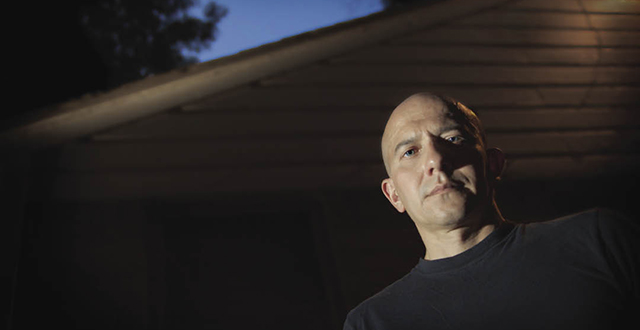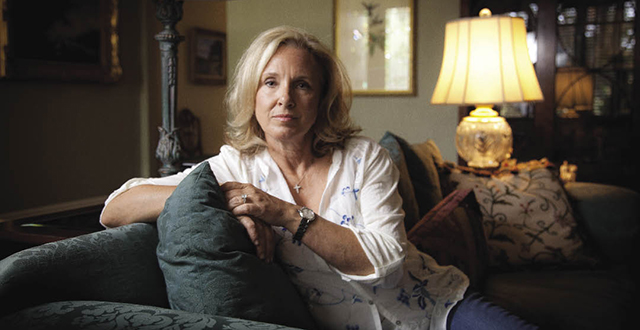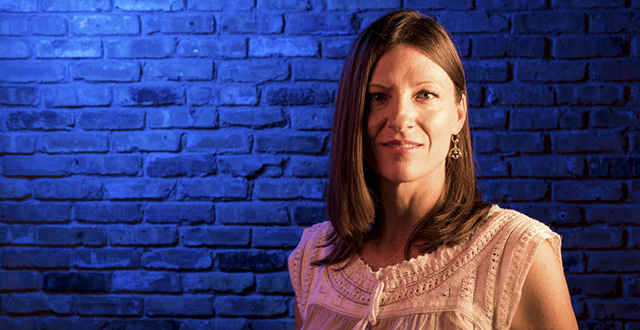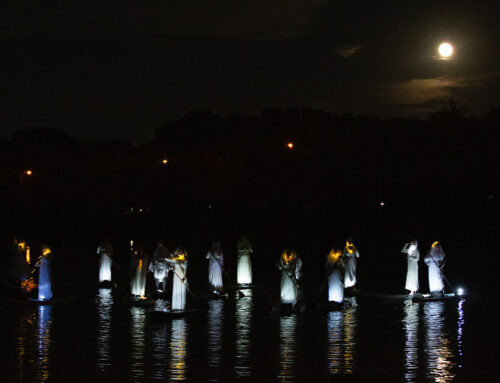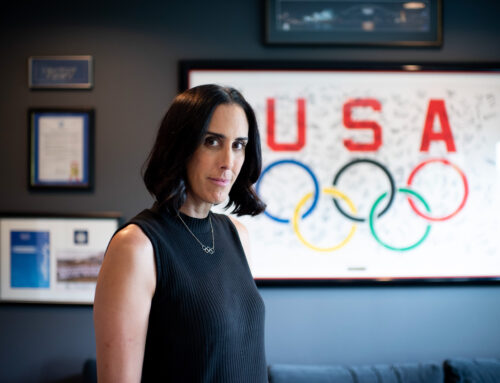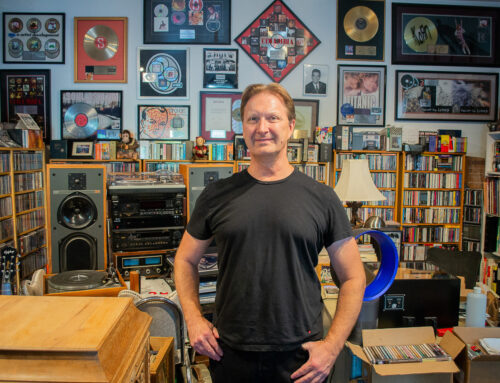Lakewood residents’ near misses, miraculous recoveries and other near-death experiences.
A slip, a lump, the doctor’s call — the end can arrive in a flash or approach stealthily. Why do some make it when others do not? How does a near-fatal event impact a subsequent life? Our subjects, who have forcibly faced their own mortality, can’t say for sure. But because of their respective experiences, they do tell us with conviction that life is precarious and not to be taken for granted.
Josh Bullard
Many families have those favorite family tales they like to rehash at get-togethers. For neighbor Josh Bullard and his family, it’s the time they narrowly escaped a roof collapse in Anchorage, Ak.
“That is definitely one of the most vivid memories I have as a kid,” Bullard says with a chuckle. “A lot of things I don’t remember as a kid, but that is one thing I can always recall.”
Bullard lived a number of places growing up — from Colorado to the United Kingdom. During winter 1987, Bullard was 10 years old and living in Anchorage. His mother regularly took him and his brother to church on Sunday mornings, but this particular Sunday, that was a treacherous feat.
“During the service, there was a loud cracking sound,” Bullard explains. “People started to shout and point up to the high ceiling of the church. I looked up and remember seeing cracks forming and quickly spreading outward.”
People began evacuating the church through two side exits and one back exit, he says. Bullard’s mother grabbed him and his brother and pushed them under a pew for protection as people filed out of the large auditorium.
“We were probably under there for only a few seconds, but it seemed like minutes,” Bullard says.
A man ran up and grabbed Bullard and his brother and pulled them toward the back exit, he says. Just as the trio passed through the doorway, Bullard heard a loud crashing sound, and suddenly the group was propelled forward by a strong gust of air. They slammed into a banister, which luckily held under the force of their impact, because it would have been a long fall if it hadn’t.
“Basically, not only did my brother and I almost die from the roof collapsing, but if the banister hadn’t stopped us, we would have fallen down two flights of stairs,” he says.
Bullard says he doesn’t know who the man who helped him and his brother is, but he’s grateful all the same. “If he hadn’t done what he did, who knows what would have happened,” he says. As it turned out, not one single person was hurt in the collapse.
Bullard later found out the explanation for the collapse: The roof was covered with so much snow, it couldn’t support the weight — and apparently that’s not terribly uncommon.
“I was trying to find more details about [this particular incident], so I started to Google it and found more recent stories where that had happened at churches up there,” Bullard says. “I guess we only have to worry about tornadoes here. Or hail.”
Diana Miller
In March 2003, a couple of weeks before a routine mammogram, East Dallas neighbor Diana Miller couldn’t seem to stop thinking about breast cancer.
She wasn’t sure why, but she’d become a tad obsessed with casually musing about what she would do if she found out she had breast cancer — how she would react, how she would tell her husband and her three young children.
“I wasn’t really worried about it, but all these things were on my mind,” she says.
During the mammogram, the doctors found calcification in Miller’s breast tissue, which looks like little flecks of sand that can’t be felt.
“I was a little concerned,” Miller says, “but the doctors were very upfront with me. They said 80 percent of the time they are benign, and only 20 percent of the time they’re breast cancer, and I thought, ‘Oh, that’s a great ratio.’”
The doctors said they would do a biopsy and call her later that day to tell her the result.
“So I hung around the house, and I wasn’t really worried about it, but again, all these things are going through my mind,” she says.
Then the radiologist called and told her the news: It was breast cancer.
Miller didn’t panic; rather, she remained calm and asked a lot of questions. She already had a breast surgeon from a previous cancer scare, so she asked if there was anyone else she needed to talk with.
“The radiologist was like, ‘Wow, you seem to be really on top of things; are you OK?’ and I said, ‘Yes, I’m fine,’” Miller recalls.
“So we talked for a little longer, and then I got off the phone, walked into the living room, sat down on the sofa and cried really hard for about 10 or 15 minutes — just really sobbing.
“Then I thought, ‘OK, enough of this; I’ve got work to do.’ So I wiped my tears away, found the number of my breast surgeon and called to make an appointment.”
When she called her husband to let him know, he asked if she was OK, and she assured him she was.
“As the days went on, I thought I was so wise and so smart; I had all these questions ready and had everything figured out. I was really proud of myself,” Miller says, laughing.
“But then I realized it wasn’t me at all. It was really God guiding me and preparing me. When I realized that, it was like a new life inside of me. I felt a peace about the situation because I knew it was in His hands, and what’s a better winning team?”
The doctors found the cancer so early that Miller didn’t need chemotherapy, only radiation.
“Every day that I would go in for radiation, I was excited because I was one day closer to being healed,” Miller says.
Not only was the radiation making her cancer-free, but it also gave her an opportunity to meet other women who were going through the healing process.
“I met so many different women of all different ages and stages of cancer. It ran the gamut, and we’d all be sitting in the waiting room together in these gowns, each waiting to be called,” she says.
“The stories I would hear and the different attitudes, it was very … it’s hard to describe … bonding, but it was more like we had a spiritual connection. It was a very important part of that journey.”
There were times she felt a little guilty when she met women who had harder experiences with breast cancer than she did, but she was grateful she had the opportunity to be a part of their journeys.
“It sounds really weird, but it really was one of the best things that’s ever happened to me. People always say, ‘How can you say that?’ But it really was.”
Today Miller has been cancer-free for 10 years. She participates in as many breast cancer events as possible, and she continues to bond with other breast cancer survivors.
“It’s a little like being in a sorority,” Miller jokes. “Even if we’re not the same age, we’re sisters and we have that bond. And some people who I already knew who had had breast cancer, our relationships became more intimate. I called on women I knew, and now other women call me. All of a sudden, we have that intimate connection.
“If this had not happened to me, I could not serve others in that way. So that has been huge.”
Christine Rogers
Bam bam bam!
Christine Rogers woke from her groggy sleep just long enough to recognize the frantic banging on her door, curse at her friends for waking her up so soon after she’d finally fallen asleep, and then roll back over.
“There’s a fire!” her friend yelled through the door, but once again, Rogers shrugged it off.
“I was like, ‘Whatever. I would know if there was a fire,’ ” Rogers recalls, “and I went back to sleep.”
Finally her friend, a commanding Irish girl named LeeAnne, flung the door open, ran over, grabbed Rogers by the lapels and sat her up in the bed, saying, “Christine, there is a fire.”
“And I opened my eyes and I couldn’t see her. There was so much smoke in the room that I couldn’t see her,” Rogers says. “And I was fully intent on sleeping right through that.”
East Dallas neighbor Rogers was in college at the time, visiting some friends at a nearby university in Milwaukee.
Rogers had just broken up with her then-boyfriend, now-husband, Tim, and needed a girls’ night out to take her mind off the drama. She and her friends had spent the evening in true college-girl fashion — primping, dancing, drinking, snacking and chatting — and they had documented the whole night with Tim’s expensive camera, which Christine had secretly borrowed for the weekend getaway.
The group had retired well after 3 a.m., and Rogers had just fallen asleep, exhausted and inebriated, when LeeAnne jolted her out of her slumber to a room full of smoke.
“That’ll sober you up fast,” Rogers says.
LeeAnne yelled at her to go to the back door, but Rogers didn’t know where the back door was, so instead she ran to the front door and opened it.
“This big, billowing cloud of flame and smoke came in, right over my head,” Rogers says. “I must’ve just grazed it. I didn’t get burned, but it went right over my head, licked up over the top of the door frame, and I’m just sitting there, jaw dropped.”
LeeAnne ran up behind her and slammed the door closed, yelling for Rogers to go to the back door. The two started running, LeeAnne leading the way through the apartment. When they reached the back exit, they found that the rest of the group already was out on the landing. Unfortunately, however, it wasn’t much safer out there.
“This was a brownstone building, which is a super, super old style of building,” Rogers explains. “The fire escape was basically a wooden deck. The steps were wooden with walls of wood that went up, so no air could circulate. Just a downward tunnel of smoke-filled chambers.”
The group began making their descent from the third floor, trying not to stumble over pieces of junk — an old refrigerator with its door ajar, a broken bike, people’s bags of trash.
“We get about halfway down, and we’re all coughing and snorting and crying, and all kinds of tragic noises,” Rogers says, “and I remember thinking, ‘This is it. I’m done. There’s no oxygen here to breathe. I can’t make it anymore.’ I’m thinking about my parents and how sad they’re going to be, I’m thinking about my brother and my sister, and then I think, ‘Tim is going to be so pissed when he realizes his camera has melted.’ ”
But just as Rogers was about to cash in her chips, LeeAnne began barking orders — “Let’s go, people! It’s better down here! Let’s go, let’s go!” — which infused a burst of energy into the group and spurred them onward.
Finally they reached the bottom, and the firefighters and Red Cross volunteers immediately began tending to them with blankets, medical help and coffee.
“The miraculous part about all this is that no one was killed,” Rogers says, “even though every firefighter I’ve talked to since said it’s unbelievable that no one was harmed.”
Hours later, Rogers asked a firefighter how she could get her stuff back, particularly her car keys so she could go home, and the firefighter offered to escort her back into the charred remains of the building.
“In retrospect, I’m not sure how it came about that I was allowed to go back into the just-barely-extinguished apartment, but there I was,” Rogers says, laughing.
As she made her way back up the fire escape, she saw that the first two floors were completely charred.
“You couldn’t discern anything. There was nothing, just char,” Rogers says. “And then we get to my friend’s floor and everything is almost exactly as I remember it, except for some fire, smoke and water damage.
“We go in, and the door frame is warped, but the door is still there. The computer is all warped and trippy looking, the nail polish bottle that had spilled over on the coffee table was still there, and the InStyle magazine was still open to the same page. It was just so, so strange.”
Among the stuff, her car keys hadn’t been melted, her bag was smelly but uncharred and — lo and behold — Tim’s camera had managed to make it through the ordeal unscathed.
For months after that, Rogers had nightmares, which she eventually overcame, although it was a while before she enjoyed the smell of fire or smoke again.
“But I love it again,” Rogers says. “You get over it, or at least I have. The passage of time helps with that.”
If nothing else, the experience gave her great respect for firefighters and Red Cross volunteers.
“You know when you see firefighters put their boots out on the median? Anytime those are out, you’ll see me digging around in the cushion like, ‘Here, take my money, I love you guys!’ ” Rogers says with a smile.

